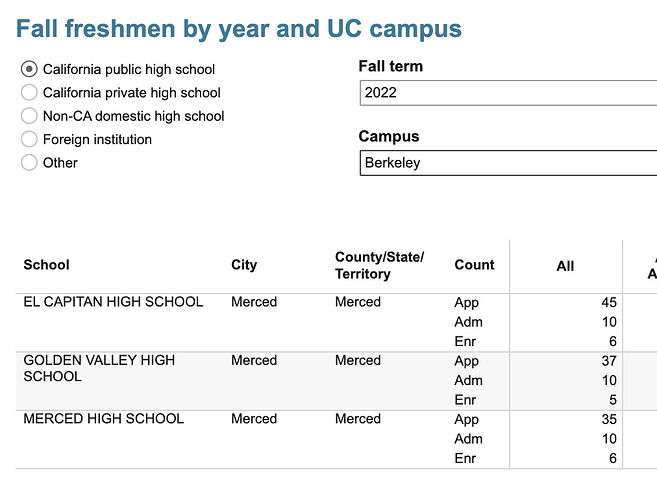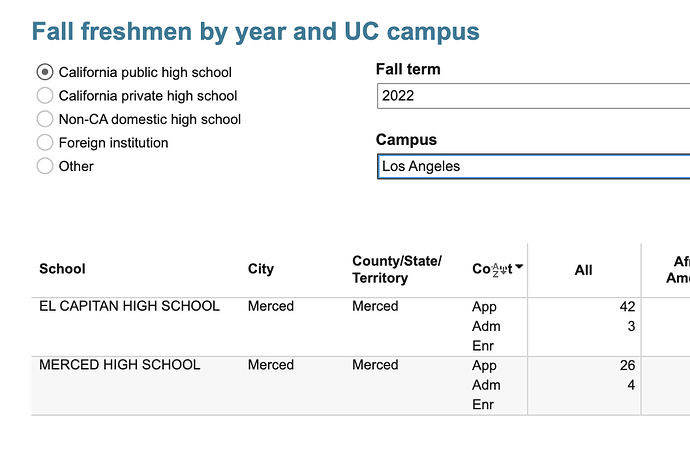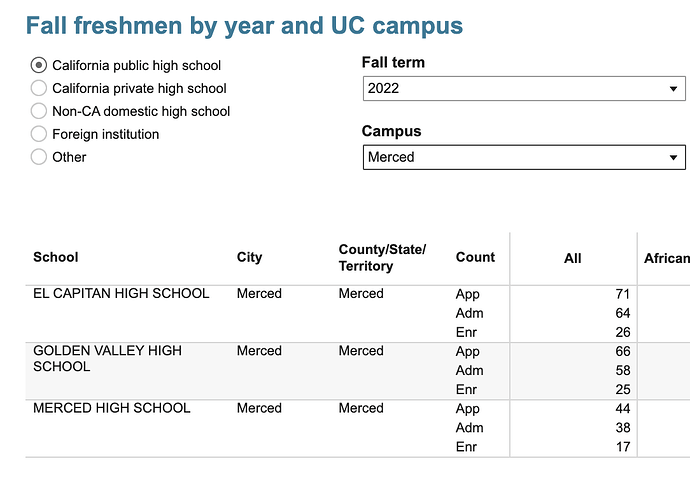The colleges have the transcripts or record of grades, with all students ordered by GPA (which at the UCs includes a measure of rigor). I expect the UCs, like many colleges, assess rigor separately as well. The better students in terms of grades and rigor will be obvious. Of course, they aren’t always admitted in order of academic stats at holistic schools because major, essays, activities, etc matter.
From the stats - and this is just for Merced, but you could choose any county - it seems largely like a non-issue. Admissions rates to UC Berkeley from the county of Merced are fairly high and in fact higher than for many Bay Area schools:
Pretty good for Davis, too:
Lower for UCLA:
Well, and the local UC:
Obviously there is some self selection going on when students choose which campuses to apply to, but I don’t seem them to be disadvantaged at campuses like Berkeley and Davis. Maybe for UCLA, but it looks about the same acceptance as at my daughter’s Bay Area high school.
Things are even better when you look at university-wide acceptances. Almost every student from Merced who applies to a UC gets into at least one campus:
From the stats, it looks like they are able to do that at a higher rate than the overall state acceptance rate.
In some cases, it seems like their acceptance rate at UCB is higher than for many Bay Area schools and, while low for UCLA, looks about on par with my daughter’s Bay Area high school.
In fairness, I randomly selected Merced. YMMV at other Central Valley cities.
It just isn’t true that everyone (or almost everyone) in the Central Valley gets sent to Modesto. For example, UC Berkeley accepts a substantial number from the Central Valley every year.
Here’s a breakdown (apps/admit/enroll) that can be sorted for schools in the various Central Valley counties . . .
ETA: Sorry. didn’t see @worriedmomucb posted info from the same place.
Please move on from discussing the details of the UC system.
Doesn’t the Chetty data show this to some extent?
SAT scores were highly correlated with career success, going to elite graduate schools, working at prestigious hospitals and universities, and presumably carrying out leadership activities.
Exactly the kind of activities that would match ‘transitioning the world to clean energy’, ‘curing diseases’ and founding non-profits.
Yet, Caltech and WPI choose to be test blind, and other non-MIT private tech schools choose test optional. The test blind/optional/required decisions of other colleges doesn’t seem to follow tech schools vs non-tech schools. It’s more MIT and Georgetown choose test required, and other selective private colleges do not.
WPI has been test optional since 2007, so they have had plenty of time to review results of this policy. They mention a variety of positives, including improvements in performance and outcome (some of this may be indirect from increased selectivity). The improvements led to WPI switching from test optional to test blind.
Caltech’s website implies that Caltech found SAT/ACT testing had little power in predicting students’ performance at Caltech, as quoted below. I realize that Caltech is a unique college and don’t mean to imply that Caltech’s conclusions apply to all other colleges. Possible contributing factors include the relatively low ceiling (among Caltech students), and the application process that emphasizes other criteria, including things like faculty from relevant department reviewing the non-stat components of application.
The study, conducted by members of the Caltech faculty supported by professional staff, indicates that standardized test scores have little to no power in predicting students’ performance in the first-term mathematics and physics classes that first-year students must take as part of Caltech’s core curriculum. Further, the predictive power of standardized test scores appears to dissipate as students progress through the first-year core curriculum.
Perhaps the vast majority of students applying to Caltech have Calc BC grades/scores, some from Frosh year? And some/many have multivariate and Lin alg on their transcripts.
They have such a tiny class (~250 students), that it’s easy to find applicants with advanced-advanced math. Moreover, the SAT-M is just too low a bar for them.
College admissions and the US educational system overall certainly suffer from systemic inequality that disadvantages low income/marginalized students. While restoring testing policies is not going to be a magical solution, I think it is one of the best ways for disadvantaged students to show their academic promise, especially when considered in context.
I honestly don’t understand all this talk about inequality.
It’s not the job of colleges to be directly addressing inequalities in society. That’s the role of other levers of society.
If schools want to eliminate the ACT/SAT or implement it, it shouldn’t be for fixing inequalities or societal problems. If they want to increase low-income representation because it benefits the learning experience, that’s different from fixing inequalities more generally.
Isn’t this partially why schools are increasingly getting into hot water because they’re implementing solutions best left to other institutions?
I personally do think this is part of the role of educational institutions in the country, including colleges, and especially public colleges.
High SAT scores are also highly correlated with high income and being caucasian.
High SAT scores are also highly correlated with high income
Yes, this is true.
But the prompt I was given was ‘what evidence supports the claim that those who score highest on the SAT are most likely to cure diseases, transition the world to clean energy, and found nonprofits that benefit society?’
And to that, I said the Chetty data shows that there’s clear evidence of this by the kinds of careers that kids with high test scores go into. Indeed, it’s very correlated with income but the reality is, if you select for a class of people most likely to cure disease, transition the world to clean energy, and to found non-profits, you’re going to end up with a very wealthy class of people (and this is due to how our society is structured, not a comment on the skillset of those born without wealth vs with it).
Colleges have had 40+ years of admissions with test scores. If you’re arguing that test scores could potentially cause universities to miss out on people, universities did that for 40 years and will continue to do so without test scores when acceptance rates are under <5% at many top schools.
But re-introducing test scores would increase the ‘hit’ rate in my opinion.
Maybe. But that’s not because of their test scores. Not causation.
Plenty of colleges have lots of test optional years under the belts too, starting with Bowdoin at 50+. Nearly 1,000 of the 3,000 or so 4 year colleges were TO before the pandemic.
High SAT scores are also highly correlated with high income
So is being good at debate, so is every other extracurricular activity you can think of.
If the argument is that the ACT/SAT is only a predictor of future success because of incomes, the same could apply to extracurriculars.
Deleted.
I read the NYT article with great interest. My D20 attended a selective private HS with the middle 50% scoring between 1350-1550. The average GPA is also quite high (low 90s on a 100 point scale). I think the high test scores reinforce the high GPAs and show they are not a result of grade inflation, but are the product of hard work and smart kids.
I’ve found the prepper vs. non-prepper debate annoying. I think a lot of people on this board (an in real life) suggest that if a student prepped, it somehow diminishes the level of accomplishment or is unfair to those who can’t or don’t prep. I strongly disagree. First, as others have pointed out, while preparation makes a difference, it doesn’t turn an 1100 into a 1500. Second, many affluent kids who prep still don’t get great scores. It’s not a guarantee. Third, and most importantly in my view, is that embedded in the notion that the score is somehow less valid when a student “prepped” is that we should be valuing natural aptitude over hard work.
As any casual observer can attest, affluent parents “prep” their kids in all kinds of ways. Starting with a top PK-12 education and progressing to elite sports camps and coaches, music lessons, chess or debate coaches, subject tutors…the list is endless. We encourage our kids to practice, prepare and work hard. We wouldn’t encourage our students to show up for a final exam, a sports competition, a chess or debate tournament, or a job interview unprepared and just hope they wow everyone with their natural gifts. Negating the value of the test score on the basis that many students spend months preparing (and is thus unfair) makes no sense to me at all–unless we’re prepared to say the same about the many other ways we encourage our kids to prepare. To me, the fact that my D put herself under some pressure to do well on the SAT was a sign of her work ethic and commitment; she knew she couldn’t wing it–and that’s a valuable life lesson.
Finally, the ones really benefiting from test optional are affluent kids who can now redeploy their time to activities, sports, leadership opportunities, community service, essay coaching, etc. Yes, there are some high-profile cases of cheating (Varsity Blues), but of the millions of kids who take the SAT/ACT, most aren’t cheating. It’s a bar that affluent kids–for whom much comes easily–have to try and clear. They are RIGHTFULLY held to a higher standard than lower-income students who lack the resources. @hebegebe made this point in the initial post: context is critical.
I thought the article had excellent data about the value of the scores. Eliminating the test may obscure the inequities in our society, but it doesn’t eliminate them. Trying to fix the educational inequities in this country at the college admission level is the wrong starting point.
I posted specific numbers earlier in the thread. SAT scores only explained 1-2% of variance in which Ivy+ grads attended elite grad schools (defined as Ivy+ or one of 4 publics) or worked at prestigious firms (defined as firms that employ a disproportionately large portion of Ivy+ grads).
Well if you can’t handle that stress as a student, you are unlikely to be able to handle the workload at a firm like this.
I don’t think “prepping” is unfair, but it certainly favors kids who have access to private tutors, prep classes or even just plenty of free time to dedicate to practice. Like every aspect of the college admissions process it favors the affluent. At the same time, some kids don’t require much in the way of practice to do exceedingly well on the SAT. Not every strong tester spends months “prepping”.
Many colleges have reviewed differences in which groups are admitted as test optional and test submitter, at test optional colleges. Of the dozens of colleges I have seen do tis comparison, every one found that test optional admits were less likely to be affluent than test submitter admits. This is not surprising to me, when one looks at the distribution of high scores by income level. Some specific numbers from the Chetty study are below.
Portion of Kids Scoring 1400+ on SAT by Parents Income
99.9 Percentile Income – 19%
99th Percentile Income – 14%
98th Percentile Income – 11%
97th Percentile Income – 10%
96th Percentile Income – 8%
95th Percentile Income – 7%
90-95th Percentile – 5%
80-90th Percentile – 3%
70-80th Percentile – 2%
60-70th Percentile – 1%
50-60th Percentile – 0.7%
40-50th Percentile – 0.4%
20-40th Percentile – 0.3%
0-20th Percentile – 0.1%
At 1500+ SAT, the distribution is even more unbalanced
Portion of Kids Scoring 1500+ on SAT by Parents Income
99.9th Percentile Income – 7%
99th Percentile Income – 5%
98th Percentile Income – 4%
96-97th Percentile Income – 3%
90-95th Percentile Income – 2%
…
Median Income – 0.2%
Low Income – 0.0%
This does not discuss the reasons for the correlation with income. I’m sure on average higher quality education throughout the students’ lifetime plays a role. It’s most certainly not just better prep or higher rate of special allowances.
This correlation between scores and income is stronger than other parts of the application that I have seen reviewed. For example, the Chetty study found that after controlling for test scores, top 1% income kids were 1.2x more likely to have high scores in non-academic categories like ECs than low income kids. That 1.2x higher rate for top 1% income kids is statistically significant, but is much smaller than the correlations between high test score and income discussed above.
Lower / remedial level courses like Harvard Math Ma-Mb and Princeton MAT 100 were offered long before they were test optional due to COVID-19.
Indeed, could such colleges have needed to offer more such courses in the past (like up to the 1970s, particularly before the 1960s), when admission standards for hooked students were significantly lower than now, and such students were content with gentlemen C grades?




